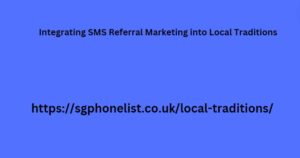In today’s digital age, customer relationships are more important than ever. But how do you keep track of all those names, numbers, and email addresses?
Building a Customer Contact Details Database
Enter the customer contact details database, your secret weapon for fostering strong connections and driving business growth. Here’s why you need one and how to build it effectively.
Why Do You Need a Customer Contact Details Database?
Imagine trying to manage all your customer interactions with a stack of index cards. Not ideal, right? A customer contact details Integrating SMS Referral Marketing into Local Traditions database offers a centralized solution for storing and organizing all your vital customer information. Here’s how it benefits your business:
- Streamlined Communication: Effortlessly launch targeted email marketing campaigns or send personalized birthday greetings, all directly from your database.
- Enhanced Customer Service: Quickly access customer purchase history and past interactions to provide exceptional service and resolve issues efficiently.
- Improved Efficiency: Save time and resources by eliminating the need to manually search for customer information scattered across different sources.
- Data-Driven Decisions: Analyze customer data to understand buying trends, identify loyal customers, and make informed marketing and sales strategies.
- Stronger Customer Relationships: Personalized interactions based on past experiences and preferences lead to increased customer loyalty and satisfaction.
Building Your Customer Contact Details Database
There are several ways to build your customer contact details database:
- Manual Entry: Collect customer information during transactions or interactions and manually add it to your database. While suitable for small businesses, this method can be time-consuming and prone to errors.
- Online Forms: Embed opt-in forms on your website or social media platforms to capture customer information at the point of contact.
- Import from Existing Sources: If you have customer data stored in spreadsheets or other software, import it into your database for easy access and management.
Choosing the Right Database Platform
The ideal platform for your database depends on the size and complexity of your business. Here are some options to consider:
- Spreadsheets: A simple Unearthing Elusive Numbers: Free Methods to starting point for small businesses, but scalability becomes an issue with large datasets.
- Contact Management Software (CMS): Offers dedicated features for managing contact details, basic communication tools, and reporting functions. Ideal for growing businesses.
- Customer Relationship Management (CRM) Systems: The most comprehensive solution, with advanced features like marketing automation, sales pipeline management, and detailed customer analytics. Best suited for businesses with complex customer interactions.
Beyond the Basics: Maintaining Your Database
- Data Quality: Regularly review and update customer information to ensure accuracy and avoid communication breakdowns.
- Data Security: Implement robust security measures to safeguard sensitive customer data, including password protection and access controls.
- Data Segmentation: Group customers based on shared characteristics for targeted marketing campaigns and personalized interactions.
- Data Compliance: Ensure your data collection and management practices comply with relevant data privacy regulations like GDPR or CCPA.
Conclusion
A well-organized customer contact details database is no longer a luxury, but a necessity for any business that values customer relationships and data-driven decision making.
By understanding its benefits
Choosing the right platform, and implementing best practices for data management, you can unlock the power of customer information and propel your business forward.
Remember trong customer
Connections are built on a foundation of knowledge – knowledge about your customers and how to effectively manage the information that fuels those connections.

